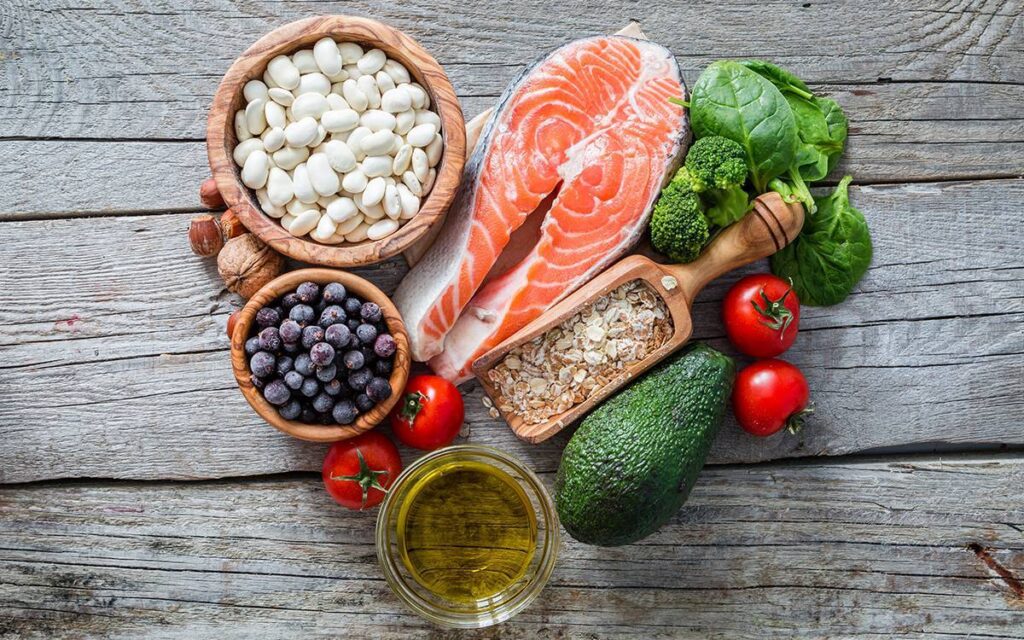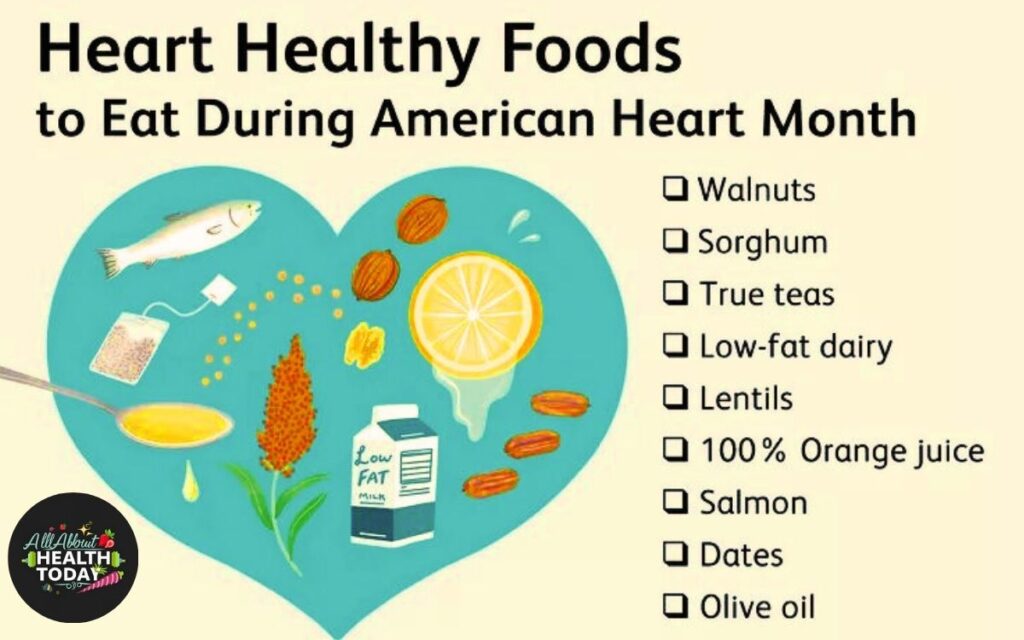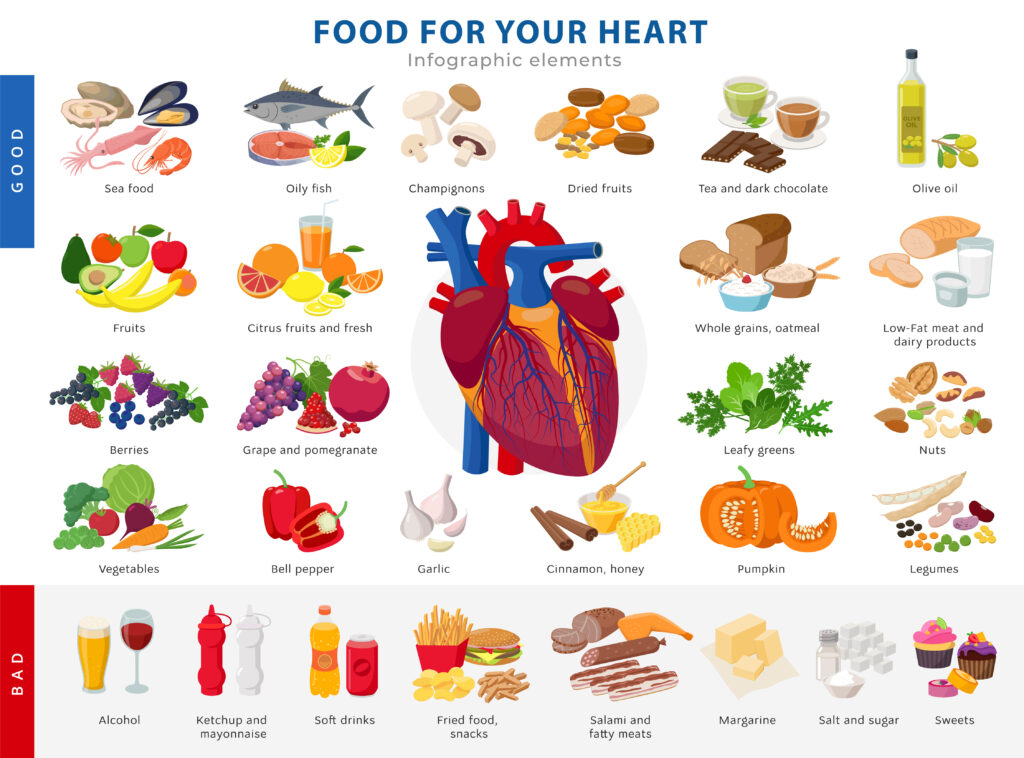Maintaining a heart-healthy diet is crucial for overall well-being and life longevity. In this ultimate guide, we will check out the best foods to eat for a strong and healthy heart, as well as those to avoid. By making informed choices about what you put into your body, you can reduce your risk of heart disease and improve your overall health. Let’s dive in and discover the key to a heart-healthy lifestyle.
Benefits of a Heart-Healthy Diet
When it comes to taking care of our hearts, what we eat plays a crucial role in maintaining good cardiovascular health. A heart-healthy diet can help lower the risk of heart disease, stroke, and other cardiovascular conditions. By incorporating the right foods into our daily meals and avoiding certain unhealthy choices, we can support our heart health and overall well-being.
One of the key benefits of following a heart-healthy diet is that it can help lower cholesterol levels. High cholesterol is a major risk factor for heart disease, as it can lead to the buildup of plaque in the arteries, restricting blood flow and increasing the risk of heart attacks and strokes. By choosing foods that are low in saturated and trans fats, we can help keep our cholesterol levels in check and reduce the risk of developing heart disease.
Another benefit of a heart-healthy diet is that it can help lower blood pressure. High blood pressure, or hypertension, is another major risk factor for heart disease and stroke. By reducing our intake of sodium and increasing our consumption of foods rich in potassium, such as fruits and vegetables, we can help regulate our blood pressure and protect our hearts.
In addition to lowering cholesterol and blood pressure, a heart-healthy diet can also help manage weight and prevent obesity. Being overweight or obese can increase the risk of heart disease, as well as other chronic conditions such as diabetes and high blood pressure. By choosing nutrient-dense foods that are low in calories and high in fibre, we can maintain a healthy weight and reduce the risk of developing these health problems.
Furthermore, a heart-healthy diet can provide essential nutrients that are beneficial for heart health, such as omega-3 fatty acids, antioxidants, and fibre. Omega-3 fatty acids, found in fatty fish like salmon and mackerel, can help reduce inflammation and lower the risk of heart disease. Antioxidants, found in fruits, vegetables, and whole grains, can help protect the heart from damage caused by free radicals. Fibre, found in whole grains, legumes, and nuts, can help lower cholesterol levels and improve digestion.
By incorporating these heart-healthy foods into our diet, we can support our cardiovascular health and reduce the risk of heart disease. However, it is also important to be mindful of foods that can hurt our hearts. Foods that are high in saturated and trans fats, such as fried foods, processed meats, and baked goods, can raise cholesterol levels and increase the risk of heart disease. Similarly, foods that are high in sodium, such as canned soups, deli meats, and fast food, can raise blood pressure and contribute to heart problems.
In conclusion, following a heart-healthy diet is essential for maintaining good cardiovascular health and reducing the risk of heart disease. By choosing nutrient-dense foods that are low in saturated fats, sodium, and added sugars, and high in fibre, antioxidants, and omega-3 fatty acids, we can support our hearts and overall well-being. Making small changes to our diet, such as incorporating more fruits and vegetables, whole grains, and lean proteins, can have a big impact on our heart health in the long run. So let’s make smart choices when it comes to what we eat and take care of our hearts for a healthier future.
Top Heart-Healthy Foods to Include in Your Diet
When it comes to living a heart-healthy lifestyle, what you eat plays a crucial role. Incorporating heart-healthy foods into your diet can help prevent heart disease and improve your overall cardiovascular health. This alongside personalized strategies to live a hearthealthy life can increase your lifespan by 25 years! In this article, we’ll explore some of the top heart-healthy foods that you should include in your diet, as well as some foods to avoid.

First and foremost, fruits and vegetables are essential for a healthy heart. These foods are packed with vitamins, minerals, and antioxidants that can help reduce inflammation and lower cholesterol levels based of a study done on the impact of cholesterol harvard health. Berries, such as blueberries, strawberries, and raspberries, are particularly beneficial for heart health due to their high levels of antioxidants. Leafy greens like spinach, kale, and Swiss chard are also excellent choices, as they are rich in vitamins A, C, and K, as well as fibre.
Whole grains are another important component of a heart-healthy diet. Foods like oatmeal, brown rice, quinoa, and whole wheat bread are high in fibre, which can help lower cholesterol levels and reduce the risk of heart disease. Additionally, whole grains are a good source of vitamins and minerals that are essential for heart health.
Fatty fish, such as salmon, mackerel, and sardines, are rich in omega-3 fatty acids, which have been shown to reduce inflammation, lower blood pressure, and improve overall heart health. These fish are also a good source of protein, which is important for maintaining muscle mass and supporting overall cardiovascular function.
Nuts and seeds are another great addition to a heart-healthy diet. Almonds, walnuts, flaxseeds, and chia seeds are all high in omega-3 fatty acids, fibre, and antioxidants, making them excellent choices for heart health. These foods can help lower cholesterol levels, reduce inflammation, and improve blood sugar control.
In addition to these foods, it’s important to include lean proteins like chicken, turkey, and tofu in your diet. These foods are low in saturated fat and cholesterol, making them heart-healthy choices. It’s also important to limit your intake of red meat, processed meats, and high-fat dairy products, as these foods can increase your risk of heart disease.

When it comes to beverages, water is the best choice for heart health. Staying hydrated is important for maintaining healthy blood pressure levels and supporting overall cardiovascular function. Green tea is another good option, as it is rich in antioxidants that can help reduce inflammation and improve heart health.
In conclusion, incorporating a variety of heart-healthy foods into your diet is essential for maintaining a healthy heart. Fruits, vegetables, whole grains, fatty fish, nuts, seeds, and lean proteins are all excellent choices for supporting cardiovascular health. By including these foods in your diet and limiting your intake of unhealthy foods like red meat, processed meats, and high-fat dairy products, you can reduce your risk of heart disease and improve your overall well-being. Remember, small changes to your diet can make a big difference in your heart health in the long run.
Foods to Avoid for Heart Health
When it comes to maintaining a healthy heart, what you eat plays a crucial role. While there are plenty of heart-healthy foods that can benefit your cardiovascular system, there are also certain foods that you should avoid to keep your heart in top shape. In this article, we will explore some of the foods that you should steer clear of if you want to maintain a healthy heart.

One of the biggest culprits when it comes to heart health is trans fats. These fats are often found in processed foods, fried foods, and baked goods. Trans fats can raise your bad cholesterol levels and lower your good cholesterol levels, increasing your risk of heart disease. To protect your heart, it’s best to avoid foods that contain trans fats whenever possible.
Another food to avoid for heart health is excessive salt. Abusing salt is a common cause of early signs of a heart attack. Consuming too much salt can lead to high blood pressure, which is a major risk factor for heart disease. To reduce your salt intake, try to limit your consumption of processed foods, which are often high in sodium. Instead, opt for fresh fruits and vegetables, whole grains, and lean proteins to help keep your heart healthy.
Sugary drinks are also a major culprit when it comes to heart health. Beverages like soda, energy drinks, and sweetened teas can contribute to weight gain and increase your risk of heart disease. To protect your heart, try to limit your intake of sugary drinks and opt for water, herbal tea, or unsweetened beverages instead.
Red meat is another food that you should avoid for heart health. While red meat can be a good source of protein, it is also high in saturated fats, which can raise your cholesterol levels and increase your risk of heart disease. To protect your heart, try to limit your consumption of red meat and opt for lean proteins like chicken, fish, and plant-based sources of protein instead.
Processed meats are also a major culprit when it comes to heart health. Foods like bacon, sausage, and deli meats are often high in sodium and saturated fats, which can increase your risk of heart disease. To protect your heart, try to limit your consumption of processed meats and opt for lean proteins like chicken, fish, and tofu instead.
Finally, it’s important to avoid foods that are high in added sugars. Consuming too much sugar can lead to weight gain, which is a major risk factor for heart disease. To protect your heart, try to limit your intake of sugary foods and beverages and opt for natural sources of sweetness like fruits and honey instead.
In conclusion, there are several foods that you should avoid if you want to maintain a healthy heart. By steering clear of trans fats, excessive salt, sugary drinks, red meat, processed meats, and foods high in added sugars, you can help protect your cardiovascular system and reduce your risk of heart disease. Instead, focus on incorporating heart-healthy foods like fruits, vegetables, whole grains, lean proteins, and healthy fats into your diet to keep your heart in top shape. By making smart food choices, you can support your heart health and enjoy a long and healthy life.
Meal Planning Tips for a Healthy Heart

When it comes to maintaining a healthy heart, what you eat plays a crucial role. A heart-healthy diet can help lower your risk of heart disease, stroke, and other cardiovascular conditions. But with so much conflicting information out there, it can be overwhelming to know what foods to include in your diet and which ones to avoid. That’s why we’ve put together the ultimate guide to heart-healthy foods to help you make informed choices when it comes to meal planning.
One of the best ways to ensure you’re eating a heart-healthy diet is to focus on whole, unprocessed foods. These foods are rich in nutrients like vitamins, minerals, and antioxidants that can help protect your heart. Some examples of heart-healthy whole foods include fruits, vegetables, whole grains, nuts, seeds, and legumes. These foods are not only good for your heart but also for your overall health.
When planning your meals, try to include a variety of different fruits and vegetables in your diet. These foods are packed with vitamins, minerals, and antioxidants that can help reduce inflammation and lower your risk of heart disease. Aim to fill half your plate with fruits and vegetables at each meal to ensure you’re getting a good mix of nutrients.
Whole grains are another important component of a heart-healthy diet. Foods like brown rice, quinoa, oats, and whole wheat bread are rich in fibre, which can help lower cholesterol levels and reduce risk of disease. Try to include whole grains in your meals whenever possible, and opt for whole-grain versions of foods like pasta and cereal.
Nuts and seeds are also great additions to a heart-healthy diet. These foods are rich in healthy fats, protein, and fiber, which can help keep your heart healthy. Some good options to include in your diet are almonds, walnuts, chia seeds, and flaxseeds. Try adding them to your oatmeal, salads, or smoothies for an extra boost of nutrition.
While many foods can help support heart health, there are also some foods that you should try to avoid or limit in your diet. Foods high in saturated and trans fats, like red meat, processed meats, and fried foods, can raise cholesterol levels and increase your risk.. Try to limit your intake of these foods and opt for leaner protein sources like poultry, fish, and plant-based proteins instead.
Another food group to watch out for is foods high in added sugars and salt. These foods can contribute to high blood pressure, inflammation, and weight gain, all of which can increase your susceptibility to complications. Try to limit your intake of sugary drinks, desserts, and processed foods, and opt for whole foods instead.
In conclusion, planning a heart-healthy diet doesn’t have to be complicated. By focusing on whole, unprocessed foods like fruits, vegetables, whole grains, nuts, and seeds, you can support your heart health and overall well-being. Remember to limit your intake of foods high in saturated fats, trans fats, added sugars, and salt to further protect your heart. With these tips in mind, you can create delicious and nutritious meals that will keep your heart happy and healthy for years to come.
How to Incorporate Heart-Healthy Foods into Your Daily Routine
Eating a heart-healthy diet is essential for maintaining good cardiovascular health and reducing the risk of heart disease. Incorporating heart-healthy foods into your daily routine can be easier than you think, and with a little planning and creativity, you can enjoy delicious meals that are good for your heart.
One of the best ways to start incorporating heart-healthy foods into your diet is by focusing on whole, unprocessed foods. This means choosing fresh fruits and vegetables, whole grains, lean proteins, and fish oil for cholesterol. These foods are rich in nutrients that are beneficial for your heart, such as fiber, antioxidants, and omega-3 fatty acids.
When planning your meals, try to include a variety of different coloured fruits and vegetables. Each colour represents different nutrients that are important for heart health, so by eating a rainbow of fruits and vegetables, you can ensure that you are getting a wide range of nutrients. Some examples of heart-healthy fruits and vegetables include berries, leafy greens, citrus fruits, and cruciferous vegetables like broccoli and Brussels sprouts.
In addition to fruits and vegetables, whole grains are also an important part of a heart-healthy diet. Whole grains are rich in fibre, which can help lower cholesterol levels and reduce the risk of heart disease. Some examples of heart-healthy whole grains include oats, quinoa, brown rice, and whole wheat bread.
When it comes to protein, opt for lean sources like poultry, fish, beans, and legumes. These foods are lower in saturated fat and cholesterol compared to red meat, making them a better choice for heart health. Fish, in particular, is a great source of omega-3 fatty acids, which have been shown to reduce inflammation and improve heart health.
When cooking, try to use heart-healthy fats like olive oil, avocado, and nuts instead of butter or lard. These fats are rich in monounsaturated and polyunsaturated fats, which can help lower cholesterol levels and reduce the risk of heart disease. You can also incorporate nuts and seeds into your meals as a source of healthy fats and protein.
In addition to focusing on specific foods, it’s also important to pay attention to portion sizes and meal timing. Eating large portions of high-calorie foods can lead to weight gain and increase the risk of heart disease, so try to practice portion control and listen to your body’s hunger cues. Eating smaller, more frequent meals throughout the day can also help keep your blood sugar levels stable and prevent overeating.
Lastly, don’t forget to stay hydrated by drinking plenty of water throughout the day. Dehydration can put added stress on your heart and lead to a variety of health problems, so make sure to drink at least eight glasses of water a day. You can also incorporate heart-healthy beverages like green tea, which is rich in antioxidants and has been shown to improve heart health.
In conclusion, incorporating heart-healthy foods into your daily routine doesn’t have to be difficult. By focusing on whole, unprocessed foods, including a variety of fruits and vegetables, whole grains, lean proteins, and healthy fats, you can create delicious meals that are good for your heart. Remember to practice portion control, stay hydrated, and listen to your body’s hunger cues to maintain a healthy heart and overall well-being.







